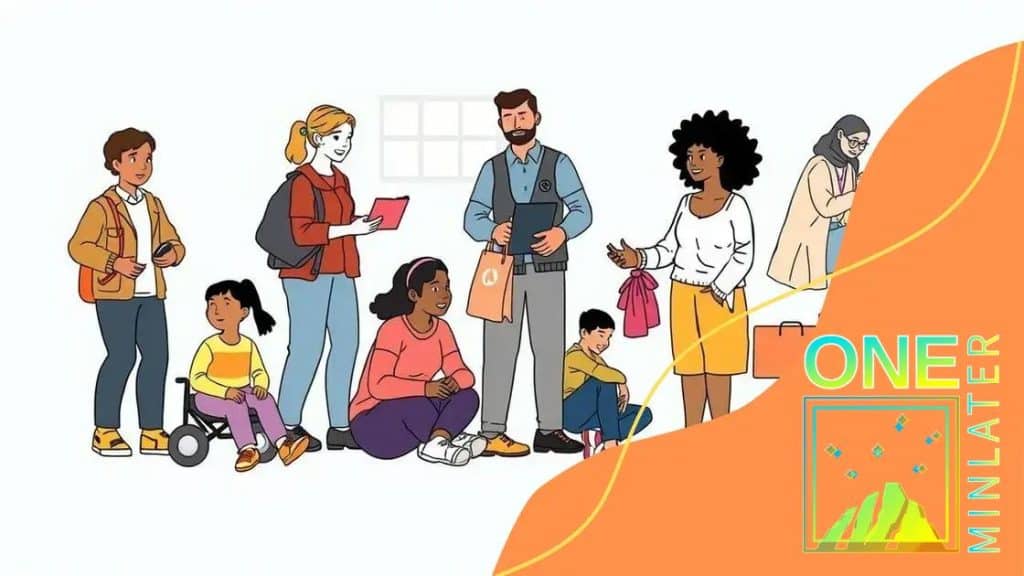Benefits for individuals with disabilities under new federal policies

Benefits for individuals with disabilities under new federal policies include increased financial support, access to job training, and enhanced educational resources that promote independence and inclusion in society.
Benefits for individuals with disabilities under new federal policies bring new hope and opportunities. Have you wondered how these changes impact daily lives? Let’s uncover what’s ahead.
Overview of new federal policies
The landscape of support for individuals with disabilities has been changing rapidly due to new federal policies. These changes are designed to improve accessibility and provide enhanced services. Understanding these policies can greatly benefit those affected.
Key Features of the New Policies
One of the standout aspects of the new federal policies is their focus on inclusivity. This includes a wide range of services and resources aimed at enhancing the quality of life for individuals with disabilities. It’s essential to familiarize yourself with these features:
- Improved access to educational resources
- Increased financial support for medical needs
- Enhanced job training programs
- Community support systems that provide necessary assistance
Furthermore, these policies aim to break down barriers that have traditionally hindered opportunities for individuals with disabilities. This could mean more access to public spaces and transportation, which are crucial for independence.
Impact on Daily Life
The impact of these policies goes beyond just legal changes. For many, it signifies a shift in how society views disabilities. The focus is shifting toward empowerment and inclusion. This could lead to new partnerships between government bodies and community organizations, aiming to create a supportive network that uplifts individuals with disabilities.
As more people become aware of these changes, the hope is that the stigma around disabilities will continue to fade. This awareness can foster an environment where individuals thrive and contribute actively to society.
Key benefits for individuals with disabilities
Understanding the key benefits for individuals with disabilities is essential in navigating the changes brought about by new federal policies. These benefits aim to promote a more inclusive society where everyone has equal access to opportunities and resources.
Financial Support
One of the significant advantages is the increased financial support available. This includes direct aid for medical expenses and assistance for daily living needs. Many individuals will now find it easier to manage expenses that once seemed overwhelming.
- Expanded eligibility for assistance programs
- Higher benefit amounts for monthly stipends
- New grants for home modifications
- Access to specialized equipment funding
These financial improvements can lessen the burden on families and promote independence for individuals with disabilities.
Access to Education and Employment
Another crucial aspect is the focus on education and employment opportunities. The new policies mandate that schools and employers provide better accommodations. This ensures that individuals with disabilities can fully participate in educational programs and the workplace.
The result is a more equitable landscape: more individuals have access to skills training and career development resources. This can lead to enhanced job satisfaction and greater economic stability.
Furthermore, community initiatives are beginning to rise that support individuals in finding gainful employment. Networking events and workshops can help bridge the gap between education and career opportunities, which is vital for achieving long-term success.
How to access new services

Accessing new services under the recent federal policies has become easier for individuals with disabilities. The process includes several important steps designed to help you effectively navigate available resources.
Identifying Available Services
The first step is to identify what services are currently available. Many organizations have updated their offerings to align with the new policies. These services can range from healthcare assistance to educational support. You can start by checking with local government websites or community centers.
- Healthcare services: Includes mental health support and physical therapy.
- Employment services: Offers job training and recruitment assistance.
- Educational resources: Programs designed for skill development and training.
Each service may have different eligibility criteria, so it is crucial to carefully review the information.
How to Apply
Once you know what services are available, the application process is your next focus. Applications can often be completed online or in person. Make sure to gather the necessary documentation, such as identification and any medical records that support your application.
Many organizations also provide assistance with filling out applications. Don’t hesitate to reach out to local advocacy groups for help. They can offer valuable guidance on navigating complex forms and requirements.
In addition, be aware of deadlines for applications to ensure you don’t miss out on vital support. Each program may have specific timelines, so keeping a calendar can be a helpful strategy to track these dates.
Success stories of individuals
Highlighting success stories of individuals with disabilities can inspire and motivate others. These stories often showcase resilience, determination, and the positive impact of new federal policies.
Real-Life Examples
Take for instance, Maria, a young woman who faced significant challenges due to her disability. With the support of new services, she accessed specialized training programs that allowed her to develop key skills. Today, she works as a software developer, proving that with the right help, anyone can achieve their dreams.
- John’s Journey: After adapting to the resources available, John found a job in his community, enhancing his confidence.
- Lisa’s Story: With new educational opportunities, Lisa earned her degree and started her own business.
- Tom’s Experience: Tom utilized advocacy groups to negotiate accommodations at work, leading to promotions.
These examples illustrate how support can change lives. Each of them demonstrates that access to services can reduce barriers and help individuals thrive.
The Role of Community Support
Community support plays a crucial role in these success stories. Local organizations often provide the resources and networks individuals need to flourish. By connecting with others who share similar experiences, many find encouragement. The importance of mentorship programs cannot be overstated, as they guide individuals in achieving their goals.
As people share their journeys, it raises awareness about the abilities of individuals with disabilities. These narratives not only empower others but also create a more inclusive society that values everyone’s contributions. Every success story is a reminder that with the right support, the possibilities are endless.
Future implications of these policies
The future implications of these policies for individuals with disabilities are significant. As the landscape of support continues to evolve, these changes promise to create more inclusive opportunities.
Long-Term Benefits
One important aspect to consider is the potential for ongoing financial support. With consistent funding, individuals will have access to resources that can help improve their quality of life. This support can lead to greater independence and a decreased reliance on government assistance over time.
- Enhanced job opportunities: As companies become more aware of the need for inclusivity, job prospects will improve for individuals.
- Better educational access: Schools may adopt more inclusive practices to support all learners.
- Increased community engagement: More programs will likely develop to include individuals with disabilities in various aspects of social life.
Moreover, as awareness increases, society’s perception of individuals with disabilities will shift, fostering a more accepting environment.
Policy Adaptations
The policies themselves are not static; they will evolve as new needs arise. This flexibility is crucial, as it allows for regular updates based on feedback from individuals and community organizations. Continuous assessment will ensure that the services provided remain relevant and efficient.
Innovations in technology will also play a role in shaping the future for individuals with disabilities. Advancements in assistive technology can make daily tasks easier, enhancing overall quality of life.
Engaging with advocacy groups and staying informed about legislative changes will be essential for individuals to maximize their benefits. As policies continue to develop, the goal is to create a society where every individual can thrive, making full use of their potential.
In conclusion, the recent federal policies bring promising changes for individuals with disabilities. These policies create new opportunities, enhance support systems, and promote inclusion in education and the workplace. As these changes take effect, individuals can access valuable resources that empower them to live independently and succeed. The power of community and advocacy cannot be overstated, as they play a critical role in shaping a supportive environment. By embracing these reforms and staying informed, everyone can contribute to a more equitable future for individuals with disabilities.
FAQ – Questions about benefits for individuals with disabilities under new federal policies
What new services are available for individuals with disabilities?
New services include financial support, job training programs, and educational resources aimed at enhancing independence and inclusion.
How can individuals access these new services?
Individuals can access services by visiting local government websites or community centers that provide information on eligibility and application processes.
What role do advocacy groups play in this context?
Advocacy groups assist individuals in navigating resources, completing applications, and connecting with available support systems.
Are there success stories from individuals benefiting from these policies?
Yes, many individuals have successfully found jobs, pursued education, and improved their quality of life through the available resources and support.





